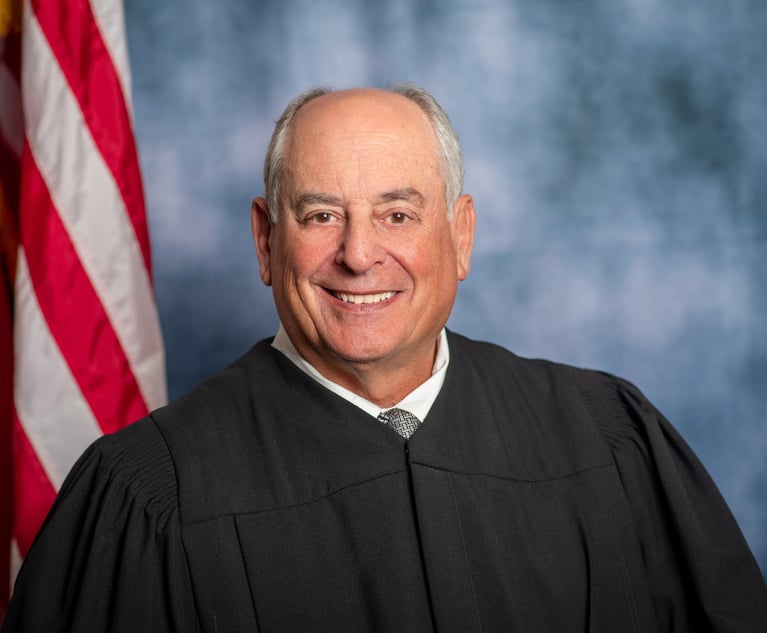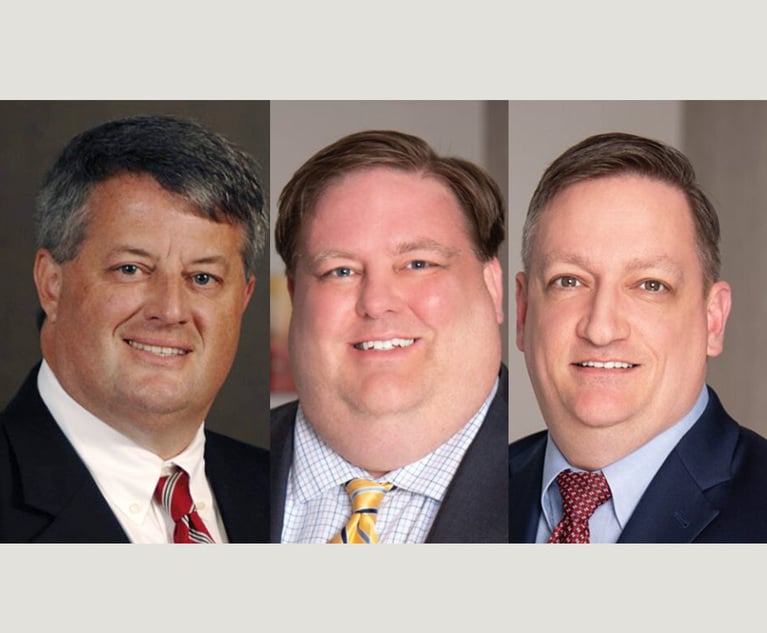 Justices John Ellington (left) and Nels Peterson, Supreme Court of Georgia. (Photos: John Disney/ALM)
Justices John Ellington (left) and Nels Peterson, Supreme Court of Georgia. (Photos: John Disney/ALM)State High Court Overrules 89 Decisions on Guilty Pleas, Debates How to Clean Up 'Mess'
Justices unanimously agreed that defendants have a right to appeal their guilty pleas, but some called for help from the General Assembly to clarify the law.
October 21, 2019 at 06:02 PM
4 minute read
Tossing 24 years of case law that one justice said was "created out of whole cloth," the Supreme Court of Georgia has held that defendants don't have to prove they would prevail in their ineffective assistance of counsel claims to have a judge review appeals of their guilty pleas.
The nine justices unanimously overruled 89 related decisions from their own bench and the state Court of Appeals but appeared split over what should happen next.
 Lewis Lamb (Courtesy photo)
Lewis Lamb (Courtesy photo)
Five justices joined a decision written by Justice John Ellington sidestepping an argument by Lewis Lamb, the district attorney in the Southwestern Circuit, whose prosecution of a murder case was at issue. Lamb asked the court to require unhappy plea-bargainers to file state habeas corpus claims rather than taking their appeal to the initial court where they were sentenced.
Lamb had said prosecuting a case years after a guilty plea is rescinded would be hard due to loss of evidence and witnesses' whereabouts, but a habeas requirement—with its four-year statute of limitations—would limit that problem.
Ellington wrote for the majority, including Chief Justice Harold Melton, Presiding Justice David Nahmias and Justices Robert Benham and Sarah Hawkins Warren, that the state could raise the defense of "prejudicial delay" to belated plea deal appeals.
Joined by Justices Keith Blackwell, Michael Boggs and Charles Bethel, Justice Nels Peterson called the majority's effort to untangle the decadeslong "mess" of jurisprudence well-intentioned but "overreaching and unduly duplicative."
"We never should have started making things up, and we ought to stop now," Peterson wrote in the concurrence, calling on the General Assembly to pass laws that would clear matters up and "save us from ourselves."
Pro Se Cases
Monday's decision was set in motion by two prison inmates who brought cases without lawyers.
In January, the court ruled in favor of Richard Terrance Ringold, who wanted to appeal his guilty plea to murder charges on the grounds that his counsel wasn't effective. Boggs wrote for the court that Ringold's claims could go forward. Nahmias concurred, saying the ruling "sounds a clear death knell for two sets of our prior holdings, and a third set of our holdings should also be promptly jettisoned."
The case of Cordalero Collier, who in 2018 sought to make similar claims about his 2009 guilty plea to a murder charge, gave the court a vehicle to make the rulings Nahmias predicted.
The court appointed Brandon Bullard and Veronica O'Grady of the Public Defender Council's appellate office to represent Collier, as he wasn't entitled to a lawyer at this stage of his case.
Bullard, who heads the office, said Monday that the decision clarifies "what had become complex law" around various qualifications for when a defendant can appeal his plea.
"It's preferable we not be engaging in mechanical denials" of defendants' efforts for review, he said, acknowledging that "a set of statutory rules would be a lot clearer."
Lamb, the district attorney in Americus, said he was considering asking the Supreme Court to reconsider its ruling. "I don't think they've given us any guidelines on prejudicial delay," he said, noting the difficulty of retaining evidence and finding witnesses years after a defendant pleaded guilty.
He added that, in a case that was tried to a conviction but then was ordered for a retrial, prosecutors at least have a trial transcript to work with to recreate testimony.
Pete Skandalakis, who directs the Prosecuting Attorneys' Council of Georgia, said his office had been anticipating this kind of decision.
"We also believe, as Justice Peterson eloquently stated in the concurring opinion, that the General Assembly may need to weigh in on this issue as this decision has both procedural and fiscal implications. We will review this issue carefully to determine how best to advise prosecutors going forward."
Attorney General Chris Carr's office issued a statement saying, "We respect the Court's position and are preparing to put their decision into practice."
This content has been archived. It is available through our partners, LexisNexis® and Bloomberg Law.
To view this content, please continue to their sites.
Not a Lexis Subscriber?
Subscribe Now
Not a Bloomberg Law Subscriber?
Subscribe Now
NOT FOR REPRINT
© 2025 ALM Global, LLC, All Rights Reserved. Request academic re-use from www.copyright.com. All other uses, submit a request to [email protected]. For more information visit Asset & Logo Licensing.
You Might Like
View All
North Carolina Courts Switch to Digital, Face Extreme Weather in 2024

'A 58-Year-Old Engine That Needs an Overhaul': Judge Wants Traffic Law Amended
3 minute read
Fulton Jury Returns Defense Verdict After Pedestrian Killed by MARTA Bus
8 minute read
'The Best Strategy': $795K Resolution Reached in Federal COVID-Accommodation Dispute
8 minute readTrending Stories
Who Got The Work
Michael G. Bongiorno, Andrew Scott Dulberg and Elizabeth E. Driscoll from Wilmer Cutler Pickering Hale and Dorr have stepped in to represent Symbotic Inc., an A.I.-enabled technology platform that focuses on increasing supply chain efficiency, and other defendants in a pending shareholder derivative lawsuit. The case, filed Oct. 2 in Massachusetts District Court by the Brown Law Firm on behalf of Stephen Austen, accuses certain officers and directors of misleading investors in regard to Symbotic's potential for margin growth by failing to disclose that the company was not equipped to timely deploy its systems or manage expenses through project delays. The case, assigned to U.S. District Judge Nathaniel M. Gorton, is 1:24-cv-12522, Austen v. Cohen et al.
Who Got The Work
Edmund Polubinski and Marie Killmond of Davis Polk & Wardwell have entered appearances for data platform software development company MongoDB and other defendants in a pending shareholder derivative lawsuit. The action, filed Oct. 7 in New York Southern District Court by the Brown Law Firm, accuses the company's directors and/or officers of falsely expressing confidence in the company’s restructuring of its sales incentive plan and downplaying the severity of decreases in its upfront commitments. The case is 1:24-cv-07594, Roy v. Ittycheria et al.
Who Got The Work
Amy O. Bruchs and Kurt F. Ellison of Michael Best & Friedrich have entered appearances for Epic Systems Corp. in a pending employment discrimination lawsuit. The suit was filed Sept. 7 in Wisconsin Western District Court by Levine Eisberner LLC and Siri & Glimstad on behalf of a project manager who claims that he was wrongfully terminated after applying for a religious exemption to the defendant's COVID-19 vaccine mandate. The case, assigned to U.S. Magistrate Judge Anita Marie Boor, is 3:24-cv-00630, Secker, Nathan v. Epic Systems Corporation.
Who Got The Work
David X. Sullivan, Thomas J. Finn and Gregory A. Hall from McCarter & English have entered appearances for Sunrun Installation Services in a pending civil rights lawsuit. The complaint was filed Sept. 4 in Connecticut District Court by attorney Robert M. Berke on behalf of former employee George Edward Steins, who was arrested and charged with employing an unregistered home improvement salesperson. The complaint alleges that had Sunrun informed the Connecticut Department of Consumer Protection that the plaintiff's employment had ended in 2017 and that he no longer held Sunrun's home improvement contractor license, he would not have been hit with charges, which were dismissed in May 2024. The case, assigned to U.S. District Judge Jeffrey A. Meyer, is 3:24-cv-01423, Steins v. Sunrun, Inc. et al.
Who Got The Work
Greenberg Traurig shareholder Joshua L. Raskin has entered an appearance for boohoo.com UK Ltd. in a pending patent infringement lawsuit. The suit, filed Sept. 3 in Texas Eastern District Court by Rozier Hardt McDonough on behalf of Alto Dynamics, asserts five patents related to an online shopping platform. The case, assigned to U.S. District Judge Rodney Gilstrap, is 2:24-cv-00719, Alto Dynamics, LLC v. boohoo.com UK Limited.
Featured Firms
Law Offices of Gary Martin Hays & Associates, P.C.
(470) 294-1674
Law Offices of Mark E. Salomone
(857) 444-6468
Smith & Hassler
(713) 739-1250






